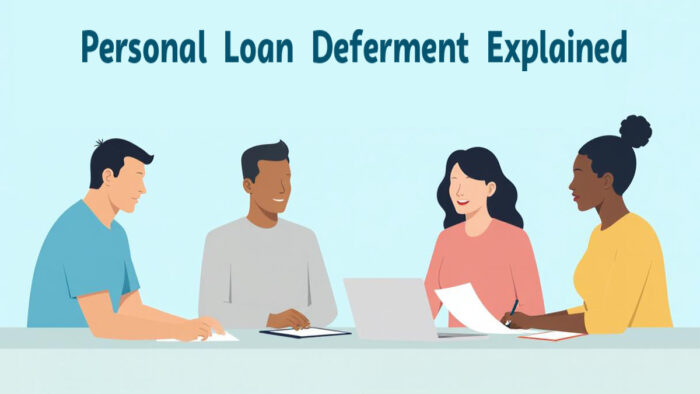If you are experiencing financial challenges, it may be difficult for you to cover all your monthly payments. In addition, you shouldn’t stop making payments on your loan if you think you are experiencing difficulties that prevent you from paying. Getting a personal loan deferment is a suitable option for your credit and can facilitate your financial stability.

Personal loan deferment, also known as forbearance, is the ability offered by a lender to postpone personal loan repayments without violating the loan contract. A loan can be deferred if you postpone the loan term by an agreed-upon amount of time. However, most lenders enable deferred payments for a limited time before returning normal payments, such as up to 90 days.
Personal loan deferment offers temporary financial relief, but deeper issues may require other debt management methods. However, you should monitor credit during and after deferment to ensure accurate reporting and avoid damage to your score. Credit monitoring can help track credit rebuilding progress.
How Personal Loan Deferment Works
To obtain a personal loan deferment or any form of loan, it’s advisable to get in touch with your lender and discuss your circumstances. Additionally, you could be eligible for deferment even if most lenders have their qualification standards for approval if you are facing the following:
- Financial difficulty because of a job loss or time limits.
- Economic difficulty brought on by health concerns.
- Challenges due to a significant life event, like losing your partner’s job.
To accept your personal loan deferment, most lenders might mandate you to submit documentation of these circumstances. In other words, you remain responsible for making payments until your request is accepted. For example, you will need to make payments if you apply for deferment on January 1st and it is due on January 5th. If not, you may have to pay late payment fees and face other punitive actions.
However, if your request is accepted, you will receive a letter indicating the terms of your payment deferral. Furthermore, these terms include information on interest accrual and when to make the next payment.
Who is Eligible for Personal Loan Deferment?
To obtain a personal loan deferment, borrowers should contact their lenders and inquire about any necessary eligibility requirements for approval. Moreover, most lending organizations demand adequate documentation of financial hardship, such as unemployment records, hospital bills, etc. If a borrower meets the requirements listed below, they may be eligible for loan deferment:
- Lost their job or saw a decrease in income.
- An unexpected medical issue in the family.
- Pandemic similar to COVID-19.
- Political unrest or a national emergency such as a war.
- Disasters caused by nature or humans.
Can Personal Loan Deferment Affect My Credit?
Your credit will not be affected if your lender has accepted you for a personal loan deferment. Generally, your lender sends a report to the credit bureaus regarding your payment, including if you are on time, late, or delinquent. However, your credit will be affected negatively if you make a late payment or none at all.
However, your report will be stated as deferred during a deferred payment. This shows that they consented to not deduct payment for that month, so your credit score won’t be affected due to late payment. However, you must note when your deferment will expire. If you forget to apply for another deferment or fail to make a payment after the current one expires, you might pay a late fee, and it will affect your credit score negatively.
How to Get a Personal Loan Deferment
Personal loan deferment is an alternative for borrowers who are experiencing financial hardships. However, you must maintain constant communication with your lender frequently.
Also, keep records of every communication, especially phone and email conversations. Furthermore, asking questions and getting clarifications is crucial in any aspect of a deferment agreement. However, the following are the processes to get a personal loan deferment:
• Speak with lender
If you believe that you might have issues paying your loan, it’s advisable to speak with your lender. In addition, you should be sincere and discuss the purpose of requesting a personal loan deferment. Offering information will permit the lender to comprehend your situation, and you should continuously make payments until it’s authorized.
• Gather documentation
You should be ready to present any supporting documentation. This includes income verification, medical bills, or termination notices that your lender can attest to your circumstances. Furthermore, lenders need documentation of the hardship to determine your eligibility.
• Review deferment terms
Generally, you must carefully review the terms and conditions of the deferment agreement that your lender has given you. In addition, it’s important to keep track of the length of the deferment, any interest that accrues, and the anticipated return date of regular payments.
You should also note that your credit may be affected and your loan may be deemed in default if you begin to make late payments. If you skip payments completely without informing your lender of the issue, the same issue will occur.



